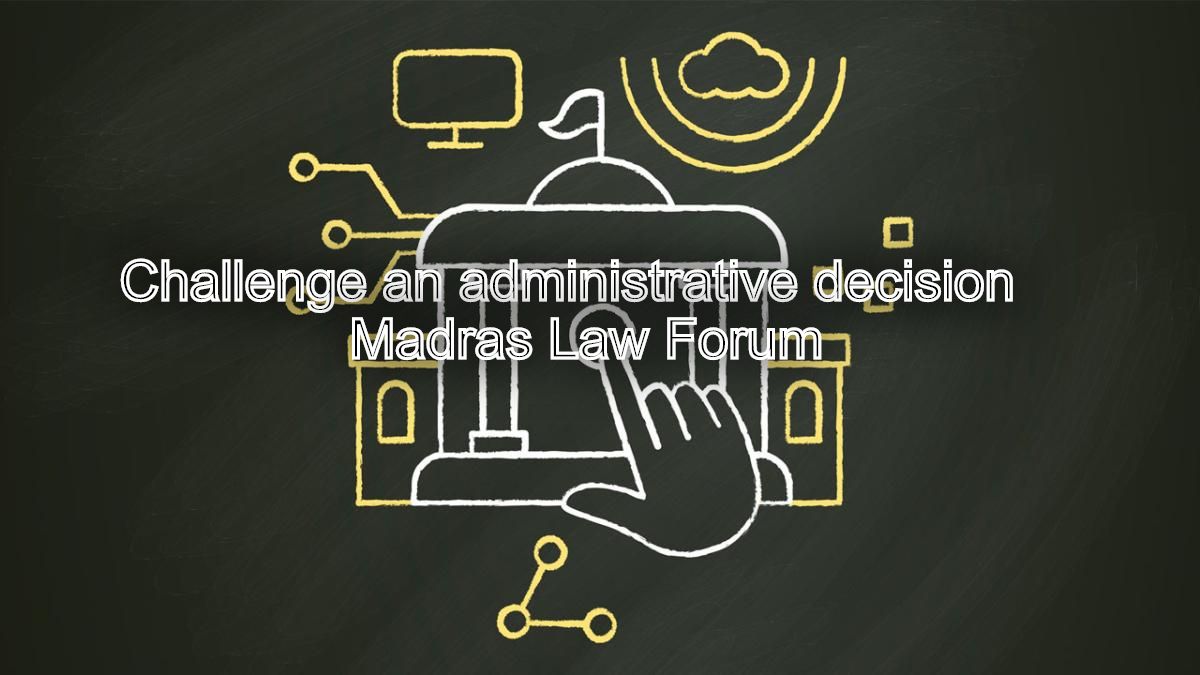How can I challenge: In a democratic nation like India, administrative authorities are vested with significant powers to govern and regulate various aspects of public life. However, this power is not absolute and is subject to checks and balances. Citizens have the right to challenge administrative decisions that are considered to be unlawful, arbitrary, or unjust. This right to challenge administrative action is crucial for ensuring good governance, protecting individual rights, and maintaining the rule of law.
How can I challenge an administrative decision in India: Madras Law Forum
Understanding Administrative Action
Administrative action encompasses a wide range of decisions and orders issued by administrative authorities, such as government departments, statutory bodies, and public officials. These decisions can include, but are not limited to, granting or denying licenses, imposing penalties, making appointments, and acquiring land for public purposes.
Grounds for Challenging Administrative Action
Citizens can challenge administrative decisions on various grounds, including:
- Lack of Jurisdiction: When the administrative authority acts beyond its powers or jurisdiction.
- Violation of Procedural Law: When the administrative authority fails to follow the prescribed procedures, such as not providing an opportunity to be heard or not considering relevant evidence.
- Violation of Principles of Natural Justice: When the principles of natural justice, such as the right to be heard, the right to a fair hearing, and the principle of <i>audi alteram partem</i> (the right to be heard by the other side), are violated.
- Unreasonableness: When the administrative decision is so unreasonable that no reasonable person could have arrived at such a conclusion.
- Malafide Intention: When the administrative action is motivated by malice or improper motives.
- Violation of Fundamental Rights: When the administrative action infringes upon the fundamental rights guaranteed by the Constitution of India.
Available Remedies
Various remedies are available for challenging administrative decisions in India. These include:
- Judicial Review: This is the primary mechanism for challenging administrative action. It involves seeking relief from the courts, primarily the High Courts and the Supreme Court of India.
- Writ Petitions: Under Article 226 of the Constitution, High Courts have the power to issue writs such as habeas corpus, mandamus, prohibition, certiorari, and quo warranto to protect fundamental rights and ensure the proper functioning of administrative authorities.
- Appeals: In some cases, appeals can be filed against administrative decisions to higher administrative tribunals or courts.
- Alternative Dispute Resolution (ADR): Mechanisms such as mediation, conciliation, and arbitration can also be explored to resolve administrative disputes in a more amicable and efficient manner.
Madras Law Forum: Expertise in Administrative Law
Madras Law Forum is a leading law firm in Chennai with a strong track record in handling administrative law matters. Their team of experienced lawyers possesses in-depth knowledge of administrative law principles, procedures, and remedies.
- To begin with, Madras Law Forum can provide expert legal advice on the grounds for challenging administrative decisions and the most appropriate course of action for each case.
- Furthermore, they can assist clients in preparing and filing petitions before the courts, including drafting necessary affidavits and legal arguments.
- Moreover, the firm can represent clients in court proceedings, arguing their case before judges and presenting compelling legal arguments.
- Finally, Madras Law Forum emphasizes a client-centric approach, prioritizing the needs and objectives of each client and providing personalized legal solutions.
Frequently Asked Question
An administrative decision refers to any order, rule, regulation, or action taken by a government authority or public body. This includes decisions made by:
Government departments (e.g., Revenue, Education, Transport)
Local bodies (e.g., Municipalities, Panchayats)
Public sector undertakings
Regulatory bodies (e.g., Reserve Bank of India, Securities and Exchange Board of India)
Jurisdictional Error
Procedural Lapses: The decision-making process was flawed, such as: No proper notice or hearing was given.
Bias or malafide intentions were present.
Rules of natural justice were violated.
Errors of Fact
Errors of Law
Unreasonableness
Writs like Habeas Corpus, Mandamus, Certiorari, Prohibition, Quo Warranto can be sought depending on the nature of the grievance.
Consult with a Lawyer
Gather Evidence
Draft the Petition
File the Petition
Appear before the Court
Quashing of the Decision: The court may quash the administrative order if it finds it to be illegal or invalid.
Directing Reconsideration: The court may direct the authority to reconsider the decision in light of the court’s observations.
Granting Alternative Relief: The court may grant alternative relief, such as compensation or damages, to the aggrieved party.
Dismissal of the Petition: If the court finds the challenge to be without merit, the petition may be dismissed.
Conclusion
Challenging administrative decisions can be a complex and challenging process. However, by seeking the guidance of experienced legal professionals, such as those at Madras Law Forum, individuals and businesses can navigate the legal complexities and effectively protect their rights.
Read More
- Can I seek legal remedies or compensation for environmental damage or pollution?
- How can I access information under the Right to Information Act in administrative matters?
- Can I represent myself in a civil case, or do I need an advocate
- What are the Key Principles of Administrative Law? Expert Lawyers
- What is administrative law in India? Expert Legal Remedies
- Department of Justice, Ministry of Law and Justice:
